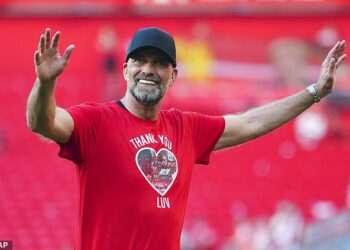Tottenham have announced the departure of Daniel Levy, who has stepped down as chairman after nearly a quarter of a century in charge.
The 62-year-old oversaw the club’s transformation into Champions League regulars and delivered their £1billion stadium.
Vinai Venkatesham will lead Spurs as CEO, with Thomas Frank in charge of the men’s team, while Peter Charrington steps in as non-executive chairman.
In a statement, Levy said: ‘I am incredibly proud of the work I have done together with the executive team and all our employees. We have built this club into a global heavyweight competing at the highest level.
‘More than that, we have built a community. I was lucky enough to work with some of the greatest people in this sport, from the team at Lilywhite House and Hotspur Way to all the players and managers over the years.’
He added: ‘I wish to thank all the fans that have supported me over the years. It hasn’t always been an easy journey but significant progress has been made. I will continue to support this club passionately.’

Tottenham have announced the shock departure of Daniel Levy, who has stepped down as chairman after nearly a quarter of a century in charge

The 62-year-old oversaw the club’s transformation into Champions League regulars and delivered their £1billion stadium
Levy’s exit marks the end of the longest reign of any Premier League chairman, having first taken charge in 2001. In that time Tottenham have moved from mid-table obscurity to establish themselves as one of English football’s elite, qualifying for Europe in 18 of the last 20 seasons and reaching the Champions League final in 2019.
He presided over the redevelopment of White Hart Lane and the building of the state-of-the-art Tottenham Hotspur Stadium, which opened in 2019 and has become a hub for both football and major events. Alongside that, Spurs invested heavily in a training centre at Hotspur Way and upgraded their academy.
Levy has often argued these developments secured the club’s long-term future and helped put Tottenham ‘on the global map’.
Yet his relationship with supporters has long been uneasy. Many saw him as a shrewd operator who kept Spurs competitive in the modern game. Others criticised his cautious approach in the transfer market, with failed pursuits of high-profile targets often leaving fans frustrated.
This summer proved another flashpoint, with Tottenham missing out on Morgan Gibbs-White and then suffering the humiliation of losing Eberechi Eze to rivals Arsenal despite being close to a deal.
Those failures reminded fans of earlier disappointments such as Willian’s switch to Chelsea in 2013 and the collapse of a deal for Jack Grealish in 2018.
Spurs’ frequent managerial changes also shaped Levy’s tenure. He worked with 16 permanent bosses, from Glenn Hoddle to Antonio Conte.
Ange Postecoglou ended the club’s 17-year wait for a trophy by lifting the Europa League in May, but was dismissed just over two weeks later after a poor league campaign. Thomas Frank, hired from Brentford, is now tasked with building a new era in north London.

Ange Postecoglou ended the club’s 17-year wait for a trophy by lifting the Europa League in May, but was dismissed just over two weeks later

Levy presided over the redevelopment of White Hart Lane and the building of the state-of-the-art Tottenham Hotspur Stadium, which opened in 2019

Vinai Venkatesham (left) will lead Spurs as CEO, with Thomas Frank in charge of the men’s team, while Peter Charrington steps in as non-executive chairman
Charrington, who now steps up to the board, paid tribute to Levy and set out the club’s direction.
‘I am very honoured to become non-executive chairman of this extraordinary club and, on behalf of the board, I would like to thank Daniel and his family for their commitment and loyalty to the club over so many years,’ he said in a club statement.
‘This is a new era of leadership on and off the pitch. We are now fully focused on stability and empowering our talented people across the club, led by Vinai and his executive team.’
Levy departs having presided over nearly 25 years of football in north London, working with 16 managers and overseeing the club’s most significant off-field changes in the modern era.
He was instrumental in delivering the Tottenham Hotspur Stadium and training centre, while helping to establish Spurs as regulars in European competition.
The club confirmed there will be no changes to the ownership or shareholder structure, with ENIC Group remaining in control.










